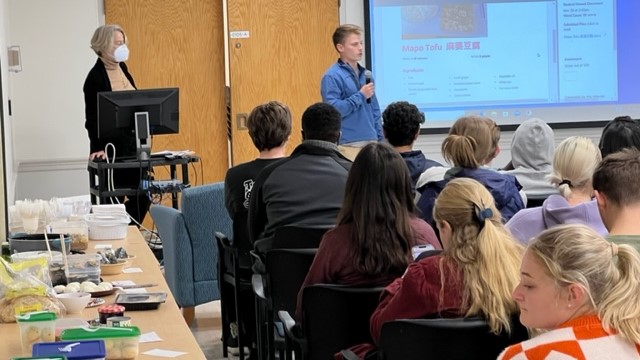Lindsay Amthor Yotsukura

School of Languages, Literatures, and Cultures
Associate Professor, Japanese
Member, Maryland Language Science Center
2106D Jiménez Hall
Get Directions
Education
Ph.D., East Asian Languages and Literatures, The Ohio State University
M.A., East Asian Languages and Literatures, The Ohio State University
M.A., Human Development, Harvard Graduate School of Education
B.A., History and East Asian Studies, Williams College
Research Expertise
Business Language
Discourse Analysis
Pragmatics
Lindsay Yotsukura received her Ph.D. (1997) and M.A. (1991) in East Asian Languages and Literatures from The Ohio State University. She received her Ed.M. degree in Human Development from Harvard University in 1987, and her B.A. in History and Asian Studies from Williams College in 1984. She specializes in Japanese linguistics, focusing on cross-cultural pragmatics and discourse analysis from a corpus-linguistic perspective. Her work has investigated the role of deixis and indexicality in spoken and written genres of Japanese in order to illuminate the strategic, situated discourse of numerous communities of practice, in particular, customer service environments.
Publications include her book, Negotiating Moves: Problem Presentation and Resolution in Japanese Business Discourse (Elsevier, 2003), and numerous peer-reviewed articles and book chapters, including "Getting to the point: Indexical reference in Japanese and English email discourse" in Bonding Through Context: Interactional Alignment in Japanese Situated Discourse (Continuum, 2020); "Negotiation and confirmation of arrangements in Japanese business discourse (Japanese Language and Literature 45:1, 2011); “Making inquiries: Toiawase strategies by Japanese L1 and L2 callers to Japanese educational institutions” (in Japanese Applied Linguistics: Discourse and Social Perspectives, Continuum, 2008); “Beikoku ni okeru Nihongo kyōiku no genjō oyobi gakushūsha dōki ni tsuite (Japanese language education and student motivation in the United States)” (Bonjinsha, 2006); "Japanese Business Telephone Conversations as Bakhtinian Speech Genre: Applications for Second Language Acquisition," in Dialogue with Bakhtin on Second and Foreign Language Learning: New Perspectives (Erlbaum, 2005); and “Learning Words, Learning Worlds” (Japanese Language and Literature 39:2, 2005). In 2006 she also completed a series of seven translations for a bilingual edition of the Nihongo Kyōiku Jiten (Taishūkan).
Yotsukura is currently at work on two research projects. One examines indexicality in Japanese business telephone conversations in Kansai (Western Japan), and the other is an historical investigation of three-way negotiations between Japanese automobile manufacturers, Allied Occupation authorities, and Japanese government ministries during the post-WWII reconstruction of the automobile industry, 1945-1949. The latter project utilizes an innovative humanities analytic approach that incorporates Google's Document AI and BigQuery tools to import and convert PDF scans of 3,000+ pages of archival materials to a digital format, tags key fields, and transfers the content to a searchable flat-file database for analysis. The corpus comprises memoranda, letters, production reports, and newspaper articles collected from the National Archives in College Park, the National Diet Library in Tokyo, and the Gordon W. Prange Collection at the University of Maryland.
Yotsukura's research has been transformed by two professional development experiences at the Santa Fe Institute led by Simon DeDeo of Carnegie Mellon University and David Kinney of Washington University in St. Louis. The first was an online course in the Foundations and Applications of Humanities Analytics in Spring 2022, followed by an in-person workshop on the same topic in July 2022. Yotsukura now collaborates with multiple teams of researchers who have expertise in humanities analytics to utilize tools such as word frequency analysis, key-word-in-context concordance searches, and topic modeling, which enable scholars to identify and trace connections within and across digitized archival documents. These connections are normally not surfaced through a manual, close reading. Two recent examples of ongoing work are her joint presentations at the 2023 Global Digital Humanities Symposium on The Rhetoric of Complaint: A Cross-Cultural Study of Online Discourse, and at the 18th International Pragmatics Conference entitled "'Her behavior was disgusting': Emotion and morality in online complaint discourse." This research has been supported by multiple UMD Faculty Fund Advancement Grants from the College of Arts and Humanities. The Foundations and Applications of Humanities Analytics course and workshop were made possible in part by a major grant from the National Endowment for the Humanities: Exploring the Human Endeavor, under Federal Award ID Number HT-272418-20.
As a Williams College graduate, Yotsukura is strongly supportive of a liberal arts education, and strives to work closely with her students in the classroom. In 2006-07, she was awarded a Lilly Fellowship by the Center for Teaching Excellence (CTE), and she has been the recipient of several Instructional Improvement Grants awarded by CTE, the Teaching and Learning Transformation Center (TLTC), and the College of Arts and Humanities in subsequent years. From 2011-2014, she served as the Resident Director of the Kyoto Consortium for Japanese Studies (KCJS), a study abroad program based at Doshisha University and administered by Columbia University.
During the 2015-16 academic year, Yotsukura worked with an Undergraduate Technology Apprenticeship Program (UTAP) assistant to update and expand online content for her popular linguistic pragmatics topics seminar entitled "Stylistic Variation in the Films of Miyazaki Hayao and Studio Ghibli" (JAPN438A). In January 2016, she led a group of 11 UM students to Tokyo and Miyagi, Japan as part of the KAKEHASHI Project, a fully expense-paid, 9-day study tour sponsored by the Japanese Ministry of Foreign Affairs. In Spring 2016, Yotsukura participated in the UTAP program once more, working with an undergraduate Japanese major to develop a mobile application for the first-year Japanese language textbook materials used at UMD. In the 2017-18 academic year, she worked with the Maryland-Kanagawa Prefecture Sister States Committee to develop an all-expense-paid internship program for UMCP and UMBC students to teach in the Kanagawa private high schools in Summer 2018. In 2019, together with her UMD colleague Michele Mason, Yotsukura developed and taught a Telluride Association Summer Seminar for high school students entitled "Constructing Gender in Japanese Popular Culture."
In addition to teaching courses at UM in Japanese language and linguistics, Yotsukura served for 21 years as the Director of UMD's Japanese program, and also served multiple times as the Director of the Center for East Asian Studies (CEAS), and the Coordinator of the CEAS undergraduate Certificate Program. From August 2020 to June 2023 she served as the Associate Director for Academic Affairs in the School of Languages, Literatures, and Cultures, and during the 2020-21 academic year, she participated in the ADVANCE Leadership Fellows program. During her spring 2024 sabbatical, Yotsukura conducted archival research at the National Diet Library in Tokyo through a travel grant from the Northeast Asia Council of the Association for Asian Studies and a UMD Faculty Advancement Grant from the College of Arts and Humanities. She continued her research based on these archival materials in fall semester 2024 as a recipient of an Independent Scholarship, Research, and Creativity Award (ISRCA) from UMD. In Spring 2025, she is serving as the Acting Head of the Department of East Asian Languages and Cultures, and Acting Director of the Center for East Asian Studies. She looks forward to returning to the post of Japanese Program Director beginning in Fall 2025.
Publications
Getting to the Point: Indexical Reference in English and Japanese Email Discourse
How is indexical reference achieved in English vs. Japanese business discourse for marketing purposes, in order to establish “bonding” between participants?
Author/Lead: Lindsay Amthor…Non-ARHU Contributor(s): edited by Risako Ide and Kaori Hata.
This chapter compares indexical expressions utilized in English and Japanese email discourse from book companies in the United States and Japan in order to highlight their referential functions and underscore their pedagogical importance. These deictics also serve a marketing purpose by constituting a bond between company and customer and encouraging further patronage. English emails adopt a relatively casual stance, with positive politeness markers such as bare imperatives functioning to invite future customer engagement. Pronominal reference also predominates, whereas in Japanese, recurring combinations of nominal forms with polite prefixes and honorific or humble polite predicates enable a company to express appreciation for a customer’s patronage, acknowledge benefits received, and indirectly index a deferent stance consonant with customer expectations for online vendors.
Read More about Getting to the Point: Indexical Reference in English and Japanese Email Discourse


